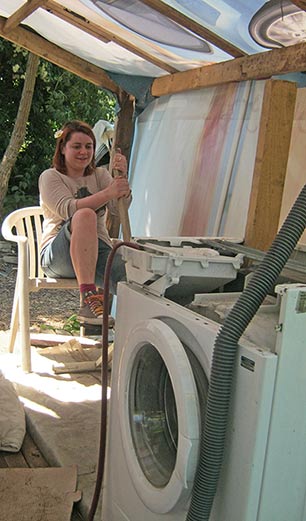Honest, paywall-free news is rare. Please support our boldly independent journalism with a donation of any size.
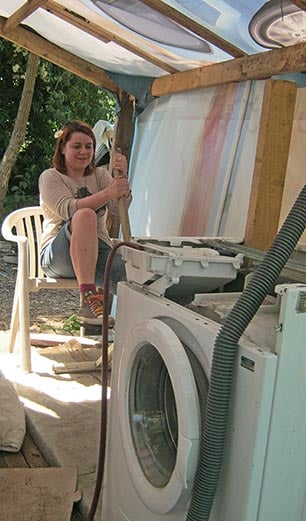 The eco-villagers use only the mechanical energy of a bicycle to make the washing machine spin. (Photo: Cristina Brooks)Faced with London’s shortage of decent accommodation, with five renters chasing every London rental property, some young people prefer living in an eco-village.
The eco-villagers use only the mechanical energy of a bicycle to make the washing machine spin. (Photo: Cristina Brooks)Faced with London’s shortage of decent accommodation, with five renters chasing every London rental property, some young people prefer living in an eco-village.
Hannah Cordon, a 25-year-old receptionist from Slough, was living in a sublet flat in Peckham, South London, with no electricity, no hot water and swarms of clothes-eating moths.
“The place I lived in didn’t have hot water because my landlord was a stingy bastard. I couldn’t flick on the hot water and have a shower. I’d get up in the morning, and I couldn’t have a cup of tea because there was no money on the electric key.”
She did not complain, she says, because, “Tenants have no rights. Landlords can revenge evict you.”
Hannah moved seven times in four years due to problems with sublets, a type of cheaper tenancy offered by a lease-holder rather than a landlord, as she was priced out of rental housing.
“If you’re looking for somewhere to live in London, you end up in sublets. They’re not technically legal so you can’t access support,” she says. The instability of housing was one reason Hannah chose to live in a squatted eco-village called Transition Heathrow.
Eco-villages and transition towns are well-thought-out squats built on derelict land to reflect permaculture principles like minimizing waste and eliminating fossil fuel consumption. There are two well-known eco-villages in London protesting the expansion of the carbon-intensive airline industry: one at Heathrow and one at Gatwick.
Eco-villages follow in the footsteps of centuries of British people living on and cultivating land they don’t own, practiced by tens of thousands at times of scarcity.
Squatting endures as an accepted form of protest against scarcity and inequality, with an estimated 20,000 squats in London in 2012, many receiving community support for decades. But many others are facing eviction. Unlike subletting, squatting commercial property is not a crime.
In practicing the environmentalist ethos, Hannah produces her own hot water and heating in ways that let her have far less of an environmental impact than a typical renter, who produces the equivalent of 9.7 tons of carbon emissions from fossil fuels per year.
Only 10 pounds per month covers all of her expenses including rent, food and renewable electricity.
Renewable electronic appliances serve daily needs at the village, including a bicycle-operated washing machine, bicycle-operated kitchen blender, waste-burning hot water boiler and off-grid wind power.
Washing clothes requires an hour of hard pedaling on the bicycle-powered washing machine, stopping twice to empty the water before the rinse and spin cycles.
“In the sublet, I didn’t even have hot water: Here, I have a cycle-powered washing machine so I get fit while I do the wash,” Hannah says.
Housing Crisis
London lacks affordable rental housing, with house prices rising alongside low construction, and with more immigration, wealthy investors are said to be trading houses, “like they are gold bars.”
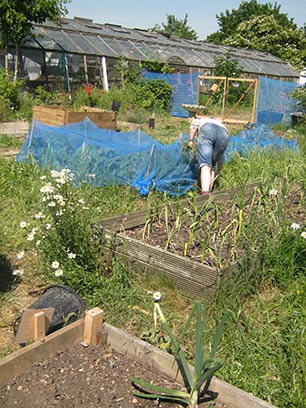 Eco-villagers make a derelict junkyard useful again by maintaining vegetable gardens and chickens on it, opening it to the public, and holding free classes and events. (Photo: Cristina Brooks)As the house-purchasing market explodes, average private London rents have risen 26 percent since 2010, and people younger than 34 make up the largest group of renters.
Eco-villagers make a derelict junkyard useful again by maintaining vegetable gardens and chickens on it, opening it to the public, and holding free classes and events. (Photo: Cristina Brooks)As the house-purchasing market explodes, average private London rents have risen 26 percent since 2010, and people younger than 34 make up the largest group of renters.
For those lucky enough to find cheap, private or social rental housing, housing can lack basics, particularly in the area of working appliances and electricity, as 13 percent do not have hot water or sufficient heating.
It is unsurprising that the quality of rentals fails to impress, given the deregulation of the private rental market, starting in the 1980s, and recent budget cuts for local government offices that handle complaints.
Mayor Boris Johnson’s scheme to get landlords to register as consumer-friendly, the London Rental Standard, has not given renters any added protections.
Young people increasingly choose more affordable, but illegal, sublets. As many as 1 in every 10 renters living in social and private housing are “unofficial tenants” and have no tenancy agreement, LetRisks estimates.
It is well within a landlord’s rights not only to kick out “illegal” subletters, but to issue unexpected evictions to renters, giving strong disincentives to complain. Subletters in particular do not have access to rent subsidies, tax rebates or other social benefits.
“There’s a big issue around housing security, which is also a problem for young tenants who are trying to live in a certain area and feel like eviction is hanging over their heads,” says Sebastian Klier, policy and campaigns manager for the UK advocacy group, Generation Rent.
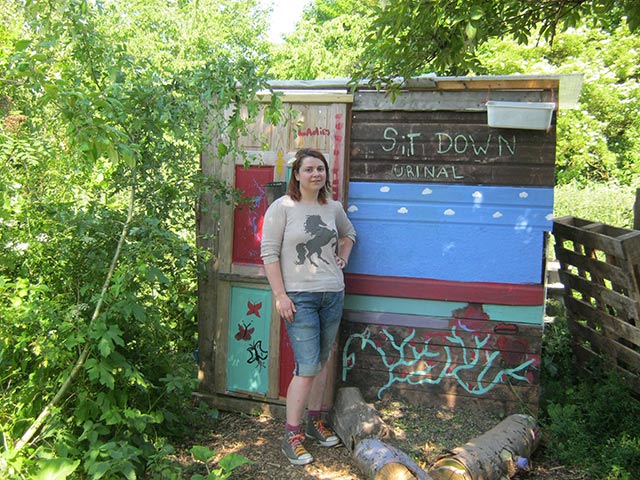 Young people take the initiative to build their own off-grid accommodations; for example, Hannah and her friends built this urinal with running water out of discarded wood. (Photo: Cristina Brooks)
Young people take the initiative to build their own off-grid accommodations; for example, Hannah and her friends built this urinal with running water out of discarded wood. (Photo: Cristina Brooks)
Affordable, Sustainable Energy
Hannah spends an hour a day chopping wood to fuel the boiler that heats water for the shack-like shower. It runs on donated scrap wood and timber that would otherwise be put in landfills.
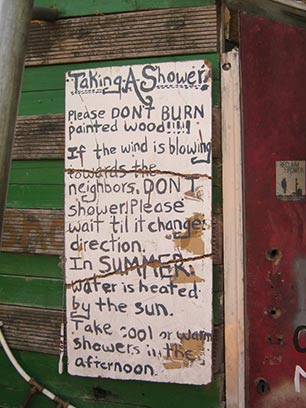 An off-grid, solar-and-wood-fired shower is conscientiously run by the entire community. (Photo: Cristina Brooks)“I’m up every day at dawn getting loads of vitamin D and chopping wood. Sometimes we tag-team for the shower, so that we keep the fire going,” she says.
An off-grid, solar-and-wood-fired shower is conscientiously run by the entire community. (Photo: Cristina Brooks)“I’m up every day at dawn getting loads of vitamin D and chopping wood. Sometimes we tag-team for the shower, so that we keep the fire going,” she says.
Wood-burning boilers still produce greenhouse gas emissions, but as long as the wood is sourced from local forests full of carbon-consuming trees, they remain low-carbon. Wood-fueled boilers are considered to contribute 90 percent less carbon emissions than other fuels, and an estimated 4 to 14 fewer tons of carbon emissions per year.
“We also have solar-heated water, but if you want to wash your hair, you need to smash up a palette,” says Hannah.
The low cost of living in an eco-village means there isn’t a need to work full time to pay rent.
Hannah says, “I could have a day off, sit and read a book or go swim in the lake, but I’m a work-oriented person, so I often wind up … doing maintenance or cooking for everyone.”
“There is so much autonomy. On Saturdays, I run reception at a clinic, and on Friday evenings, I volunteer at a vegan, organic food co-op.”
Hannah and her friends also built a female urinal, the site’s first space for women with running water.
Eco-villages, cheaper and more autonomous than rental housing, can empower young adults by giving them an affordable, sustainable housing option.
Speaking against the authoritarian crackdown
In the midst of a nationwide attack on civil liberties, Truthout urgently needs your help.
Journalism is a critical tool in the fight against Trump and his extremist agenda. The right wing knows this — that’s why they’ve taken over many legacy media publications.
But we won’t let truth be replaced by propaganda. As the Trump administration works to silence dissent, please support nonprofit independent journalism. Truthout is almost entirely funded by individual giving, so a one-time or monthly donation goes a long way. Click below to sustain our work.
